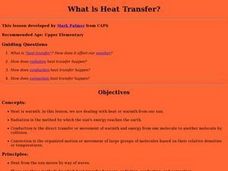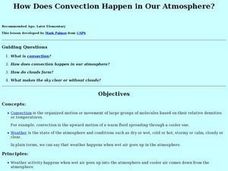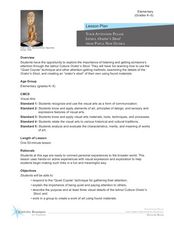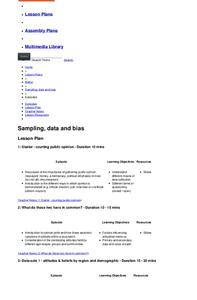Curated OER
How Much…?
In this how much activity, students complete sentences about how much things are with the words this, that, those, or these. Students complete 8 sentences.
Curated OER
How to Read a Thermometer
Students' temperature is measured using an instrument called a thermometer.
Curated OER
Does the Sun Influence the Temperature of the Earth?
Students explore whether the sun influences the temperature of the earth.
Curated OER
How Does Convection Happen in Our Atmosphere?
Students explore convection and how it happens in the earth's atmosphere.
DiscoverE
Build a Spinning Top
There's no spin needed to describe the usefulness of a dizzying resource! Using paper plates, DVDs, wooden skewers, and pencils, learners work in teams to create spinning tops. The longest-spinning top wins.
Curated OER
Dancing Flamingos
Students perform a number of activities that mimic flamingo actions and displays. The class discusses why animals behave in certain ways, and how behavioral adaptations help animals to survive.
Virginia Department of Education
Adaptation and Evolution
Um may be the atomic symbol for confusion, but it won't be needed in this instructional activity. Scholars rotate through seven stations completing experiments, hands-on activities, writing exercises, and analysis. Stations include...
Curated OER
Patterns, Patterns, Patterns
Create geometric art in your classroom. Learners use a ruler to mark lines on their paper, they then trace a lid to create a series of circles. They color in each circle using two tones or colors to create an interesting visual pattern.
Curated OER
Your Attention Please: Iatmul Orator's Stool
Students investigate art by observing historical sculptures from New Guinea. In this art history lesson, students observe pictures of the "Orator's Stool"from Papua New Guinea, while identifying the small details that make it unique....
Curated OER
English Vocabulary Skills: AWL Sublist 1 - Exercise 1b
In this online interactive English vocabulary skills worksheet, students answer 10 matching questions which require them to fill in the blanks in 10 sentences. Students may submit their answers to be scored.
Curated OER
Maps
Students investigate threee types of maps. In this algebra lesson, students idenitfy different maps and explore how they relate to the area keeping cllimate and topography in mind. They discuss maps used to navigate land. air and sea.
Curated OER
Never Say Die: The CLock of Life
Students explore ways to turn back the genetic clock. They explore cells and mitosis. Students participate in an activity to create a flip book that will animate the process of mitosis. They explain each stage of mitosis.
Curated OER
Gender Role Development
Students look in newspapers and magazines and discuss gender role development and stereotypes. In this gender lesson plan, students bring in their favorite objects that have no gender stereotype linked to it.
Curated OER
One Room Schoolhouse
Students study pictures and artifacts of the one-room schoolhouse. For this compare and contrast lesson,students list similarities and differences in schools of today and one-room schoolhouses. Then students use this analysis to write a...
Curated OER
Earth Energy Budget Pre Lab
Learners explore energy by conducting an in class experiment. In this climate change lesson, students conduct a water vapor experiment in a soda bottle. Learners utilize graphs and charts to analyze the results of the experiment and help...
Curated OER
Bugs
Students explore the wonders of bugs. In this bug lesson, students examine various types of bugs. Students make crafts, sing songs, discuss nutrition, and investigate different types of insects.
Curated OER
Greenhouse Effect- Online Interactive
In this greenhouse effect learning exercise, students learn about Earth's climate change by reading a 7 paragraph text. Students then answer 10 questions. This is an online interactive learning exercise.
Curated OER
Greenhouse Effect: A Computer Simulation
Students complete an online simulation of the greenhouse effect. In this lesson on the greenhouse effect, students use a website, similar to a webquest, to simulate and answer questions on how the greenhouse effect works. This lesson is...
Curated OER
How Islands Form
Students how islands form, rising water levels, growth of coral, and volcanoes. They complete Island Investigation worksheets after researching island formation on various Internet websites.
Curated OER
Magnetic Discovery Bottle
Students examine how to conduct simple investigations and use simple equipment to gather data. For this magnet lesson students decide what types of objects are attracted to magnets.
Curated OER
Tin Can Sculpture
Students create art from recycled materials. In this visual arts lesson, students follow the provided steps to create their own tin can artwork.
Curated OER
Life Science- Useful Waste
Fourth graders explore the topic of waste and recycling. In this useful waste lesson, 4th graders classify objects and sort them into most usable and least usable categories. Students complete an activity sheet and have a discussion on...

























